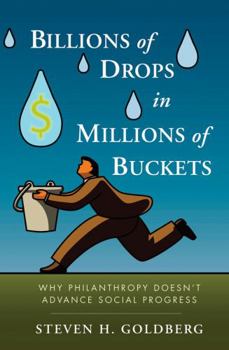Billions of Drops in Millions of Buckets: Why Philanthropy Doesn't Advance Social Progress
Select Format
Select Condition 
Book Overview
Praise for BILLIONS OF DROPS in MILLIONS OF BUCKETS "Billions of Drops in Millions of Buckets provides a bracing and original look at philan-thropy that offers a much-needed corrective to conventional wisdom. Steve Goldberg combines a resolve to understand why so much philanthropy accomplishes so little enduring social change with a timely and serious proposal to reinvigorate nonprofit capital markets through the simplest of insights:...
Format:Hardcover
Language:English
ISBN:0470454679
ISBN13:9780470454671
Release Date:July 2009
Publisher:Wiley
Length:302 Pages
Weight:1.60 lbs.
Dimensions:1.2" x 6.2" x 9.0"
Customer Reviews
3 ratings
A Critical Book for Non-Profit Leaders...
Published by Thriftbooks.com User , 15 years ago
I found this book particularly relevant because I've spent over 20 years in the for-profit world and only 3 in the non-profit world. The author points out many of the challenges, opportunities and similarities of each. I believe both industries have much to learn from one another and each could provide more value to society by investing some time doing so. This book does an extraordinary job of doing that. It spends a substantial amount of time helping to frame the problems, prescribe solutions and then frames a new way of thinking. I've bought the book for my staff, and I think it's a must read book for all non-profit leaders and funders alike.
Charity Navigation Fellow Traveler
Published by Thriftbooks.com User , 15 years ago
Steven Goldberg has nailed it on a lot of the problems faced in the nonprofit sector. Fragmentation of funding, a tremendous amount of tiny organizations that will never get to scale to really have significant social impact and the list goes on. This book is a great primer on what matters most to get the nonprofit sector turned in the right direction to truly make a difference and stop wasting so much money. The notion of a nonprofit stock market is a bit of a reach, but also an interesting idea. I highly recommend this book.
Excellent Insights!
Published by Thriftbooks.com User , 15 years ago
"Despite record levels of charitable giving and volunteerism, it has become increasingly difficult for low-income Americans to become economically and socially self-sufficient," says author Goldberg in his introduction. Philanthropy doesn't move the needle of social progress for millions of American families because there is a disconnect between funding and results. Effective nonprofits aren't rewarded with greater funding, and weak performers don't lose funding. Instead, the nonprofit capital market haphazardly distributes over $300 billion of charitable donations each year among over 2 million competing nonprofits. The recently increasing number of nonprofit organizations picking up donations in my neighborhood got me thinking that there must be a lot of duplicated overhead. Goldberg reinforced the point - in 2007, the Christian Science Monitor reported that Des Moines, Iowa had 330 nonprofits working on education issues, San Francisco had over 125 organizations addressing homelessness, and Portland, Maine had over 450 children-focused charities. The average grant among the 100 largest foundations is $50,000, and 95% are for only one year - too small and too short-lived to support development of robust and enduring nonprofits capable of achieving scale and consequential social impact. More than 90% of nonprofits have annual budgets less than $1 million, less than two dozen exceed $20 million. McKinsey and co. found for-profit companies spend only $2-4 for every $100 capital raised, while nonprofits spend $10-24, 22-43% when administrative costs are factored in. Clearly, small scale is a problem among nonprofits. Goldberg also points to several well-respected education nonprofits and points out that the funding market has failed to build their resources anywhere near the point of filling the demand for their services. "Teach for America" was launched 17 years ago, and is well-regarded by both principals and school researchers - yet, it is only able to target 3.3% of the 13 million pupils facing "educational inequity." Similarly, "Knowledge is Power Program" pupils demonstrate excellent performance on state exams, but also is quite limited in size. Goldberg proposes to substantially boost funding for successful programs by using the "wisdom of crowds" - ranking by a diverse set of individuals that is used to guide funding to where it will do the most good. All good thoughts. However, there are two problems: 1)It is unlikely that teacher unions would tolerate substantial expansion of programs threatening their grip. For example, they already are moving defuse the threat from charter schools by organizing those teachers. 2)There is amazingly little agreement on what constitutes quality education, health care, or even good economic policy. The good news, however, is that with larger programs (per following Goldberg's suggestion on rewarding programs held in highest regard), it would become more feasible to document outcomes and incorporate tha





